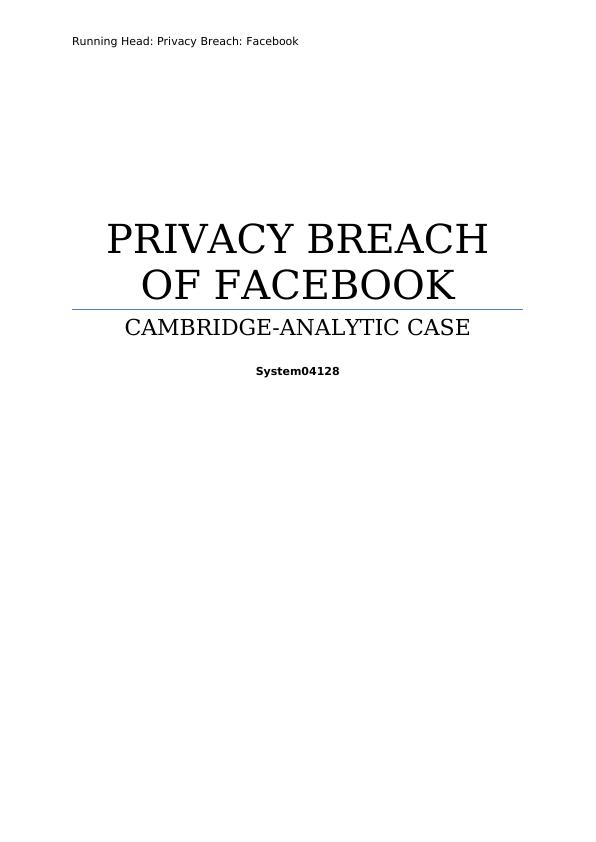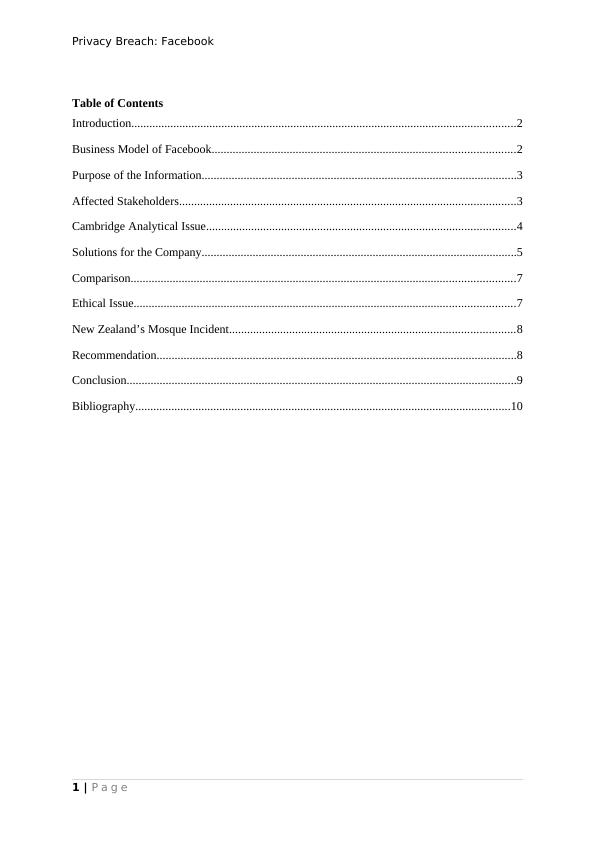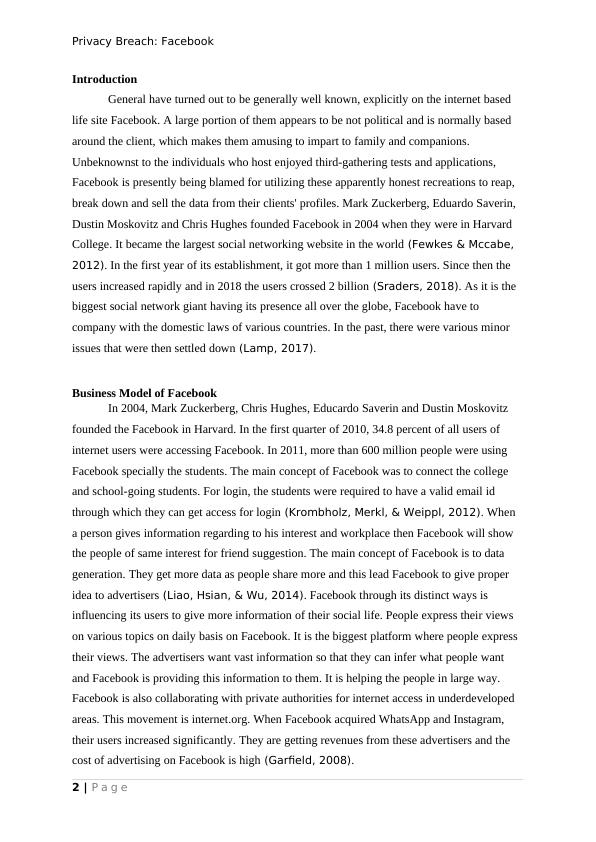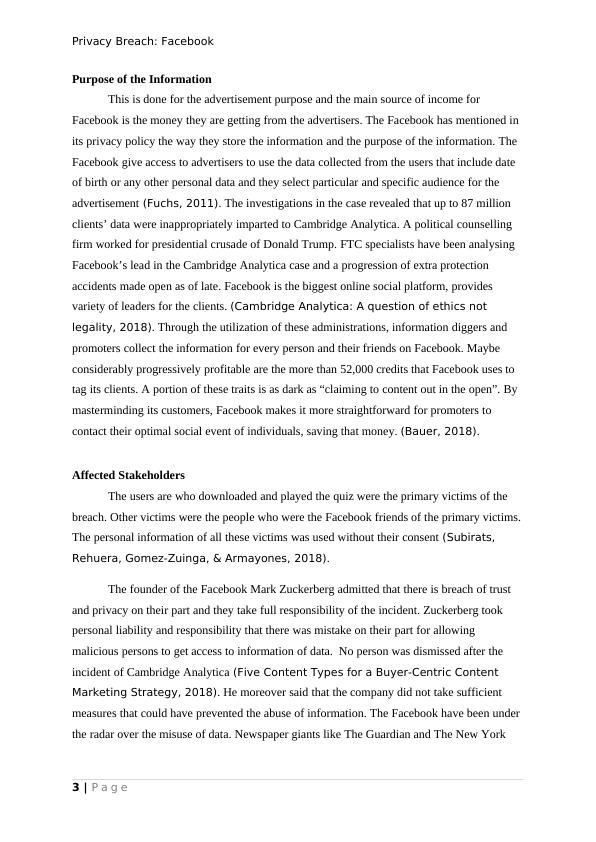Privacy Breach: Facebook
Added on 2022-12-23
14 Pages5043 Words45 Views
Running Head: Privacy Breach: Facebook
PRIVACY BREACH
OF FACEBOOK
CAMBRIDGE-ANALYTIC CASE
System04128
PRIVACY BREACH
OF FACEBOOK
CAMBRIDGE-ANALYTIC CASE
System04128

Privacy Breach: Facebook
Table of Contents
Introduction................................................................................................................................2
Business Model of Facebook.....................................................................................................2
Purpose of the Information.........................................................................................................3
Affected Stakeholders................................................................................................................3
Cambridge Analytical Issue.......................................................................................................4
Solutions for the Company.........................................................................................................5
Comparison................................................................................................................................7
Ethical Issue...............................................................................................................................7
New Zealand’s Mosque Incident...............................................................................................8
Recommendation........................................................................................................................8
Conclusion..................................................................................................................................9
Bibliography.............................................................................................................................10
1 | P a g e
Table of Contents
Introduction................................................................................................................................2
Business Model of Facebook.....................................................................................................2
Purpose of the Information.........................................................................................................3
Affected Stakeholders................................................................................................................3
Cambridge Analytical Issue.......................................................................................................4
Solutions for the Company.........................................................................................................5
Comparison................................................................................................................................7
Ethical Issue...............................................................................................................................7
New Zealand’s Mosque Incident...............................................................................................8
Recommendation........................................................................................................................8
Conclusion..................................................................................................................................9
Bibliography.............................................................................................................................10
1 | P a g e

Privacy Breach: Facebook
Introduction
General have turned out to be generally well known, explicitly on the internet based
life site Facebook. A large portion of them appears to be not political and is normally based
around the client, which makes them amusing to impart to family and companions.
Unbeknownst to the individuals who host enjoyed third-gathering tests and applications,
Facebook is presently being blamed for utilizing these apparently honest recreations to reap,
break down and sell the data from their clients' profiles. Mark Zuckerberg, Eduardo Saverin,
Dustin Moskovitz and Chris Hughes founded Facebook in 2004 when they were in Harvard
College. It became the largest social networking website in the world (Fewkes & Mccabe,
2012). In the first year of its establishment, it got more than 1 million users. Since then the
users increased rapidly and in 2018 the users crossed 2 billion (Sraders, 2018). As it is the
biggest social network giant having its presence all over the globe, Facebook have to
company with the domestic laws of various countries. In the past, there were various minor
issues that were then settled down (Lamp, 2017).
Business Model of Facebook
In 2004, Mark Zuckerberg, Chris Hughes, Educardo Saverin and Dustin Moskovitz
founded the Facebook in Harvard. In the first quarter of 2010, 34.8 percent of all users of
internet users were accessing Facebook. In 2011, more than 600 million people were using
Facebook specially the students. The main concept of Facebook was to connect the college
and school-going students. For login, the students were required to have a valid email id
through which they can get access for login (Krombholz, Merkl, & Weippl, 2012). When
a person gives information regarding to his interest and workplace then Facebook will show
the people of same interest for friend suggestion. The main concept of Facebook is to data
generation. They get more data as people share more and this lead Facebook to give proper
idea to advertisers (Liao, Hsian, & Wu, 2014). Facebook through its distinct ways is
influencing its users to give more information of their social life. People express their views
on various topics on daily basis on Facebook. It is the biggest platform where people express
their views. The advertisers want vast information so that they can infer what people want
and Facebook is providing this information to them. It is helping the people in large way.
Facebook is also collaborating with private authorities for internet access in underdeveloped
areas. This movement is internet.org. When Facebook acquired WhatsApp and Instagram,
their users increased significantly. They are getting revenues from these advertisers and the
cost of advertising on Facebook is high (Garfield, 2008).
2 | P a g e
Introduction
General have turned out to be generally well known, explicitly on the internet based
life site Facebook. A large portion of them appears to be not political and is normally based
around the client, which makes them amusing to impart to family and companions.
Unbeknownst to the individuals who host enjoyed third-gathering tests and applications,
Facebook is presently being blamed for utilizing these apparently honest recreations to reap,
break down and sell the data from their clients' profiles. Mark Zuckerberg, Eduardo Saverin,
Dustin Moskovitz and Chris Hughes founded Facebook in 2004 when they were in Harvard
College. It became the largest social networking website in the world (Fewkes & Mccabe,
2012). In the first year of its establishment, it got more than 1 million users. Since then the
users increased rapidly and in 2018 the users crossed 2 billion (Sraders, 2018). As it is the
biggest social network giant having its presence all over the globe, Facebook have to
company with the domestic laws of various countries. In the past, there were various minor
issues that were then settled down (Lamp, 2017).
Business Model of Facebook
In 2004, Mark Zuckerberg, Chris Hughes, Educardo Saverin and Dustin Moskovitz
founded the Facebook in Harvard. In the first quarter of 2010, 34.8 percent of all users of
internet users were accessing Facebook. In 2011, more than 600 million people were using
Facebook specially the students. The main concept of Facebook was to connect the college
and school-going students. For login, the students were required to have a valid email id
through which they can get access for login (Krombholz, Merkl, & Weippl, 2012). When
a person gives information regarding to his interest and workplace then Facebook will show
the people of same interest for friend suggestion. The main concept of Facebook is to data
generation. They get more data as people share more and this lead Facebook to give proper
idea to advertisers (Liao, Hsian, & Wu, 2014). Facebook through its distinct ways is
influencing its users to give more information of their social life. People express their views
on various topics on daily basis on Facebook. It is the biggest platform where people express
their views. The advertisers want vast information so that they can infer what people want
and Facebook is providing this information to them. It is helping the people in large way.
Facebook is also collaborating with private authorities for internet access in underdeveloped
areas. This movement is internet.org. When Facebook acquired WhatsApp and Instagram,
their users increased significantly. They are getting revenues from these advertisers and the
cost of advertising on Facebook is high (Garfield, 2008).
2 | P a g e

Privacy Breach: Facebook
Purpose of the Information
This is done for the advertisement purpose and the main source of income for
Facebook is the money they are getting from the advertisers. The Facebook has mentioned in
its privacy policy the way they store the information and the purpose of the information. The
Facebook give access to advertisers to use the data collected from the users that include date
of birth or any other personal data and they select particular and specific audience for the
advertisement (Fuchs, 2011). The investigations in the case revealed that up to 87 million
clients’ data were inappropriately imparted to Cambridge Analytica. A political counselling
firm worked for presidential crusade of Donald Trump. FTC specialists have been analysing
Facebook’s lead in the Cambridge Analytica case and a progression of extra protection
accidents made open as of late. Facebook is the biggest online social platform, provides
variety of leaders for the clients. (Cambridge Analytica: A question of ethics not
legality, 2018). Through the utilization of these administrations, information diggers and
promoters collect the information for every person and their friends on Facebook. Maybe
considerably progressively profitable are the more than 52,000 credits that Facebook uses to
tag its clients. A portion of these traits is as dark as “claiming to content out in the open”. By
masterminding its customers, Facebook makes it more straightforward for promoters to
contact their optimal social event of individuals, saving that money. (Bauer, 2018).
Affected Stakeholders
The users are who downloaded and played the quiz were the primary victims of the
breach. Other victims were the people who were the Facebook friends of the primary victims.
The personal information of all these victims was used without their consent (Subirats,
Rehuera, Gomez-Zuinga, & Armayones, 2018).
The founder of the Facebook Mark Zuckerberg admitted that there is breach of trust
and privacy on their part and they take full responsibility of the incident. Zuckerberg took
personal liability and responsibility that there was mistake on their part for allowing
malicious persons to get access to information of data. No person was dismissed after the
incident of Cambridge Analytica (Five Content Types for a Buyer-Centric Content
Marketing Strategy, 2018). He moreover said that the company did not take sufficient
measures that could have prevented the abuse of information. The Facebook have been under
the radar over the misuse of data. Newspaper giants like The Guardian and The New York
3 | P a g e
Purpose of the Information
This is done for the advertisement purpose and the main source of income for
Facebook is the money they are getting from the advertisers. The Facebook has mentioned in
its privacy policy the way they store the information and the purpose of the information. The
Facebook give access to advertisers to use the data collected from the users that include date
of birth or any other personal data and they select particular and specific audience for the
advertisement (Fuchs, 2011). The investigations in the case revealed that up to 87 million
clients’ data were inappropriately imparted to Cambridge Analytica. A political counselling
firm worked for presidential crusade of Donald Trump. FTC specialists have been analysing
Facebook’s lead in the Cambridge Analytica case and a progression of extra protection
accidents made open as of late. Facebook is the biggest online social platform, provides
variety of leaders for the clients. (Cambridge Analytica: A question of ethics not
legality, 2018). Through the utilization of these administrations, information diggers and
promoters collect the information for every person and their friends on Facebook. Maybe
considerably progressively profitable are the more than 52,000 credits that Facebook uses to
tag its clients. A portion of these traits is as dark as “claiming to content out in the open”. By
masterminding its customers, Facebook makes it more straightforward for promoters to
contact their optimal social event of individuals, saving that money. (Bauer, 2018).
Affected Stakeholders
The users are who downloaded and played the quiz were the primary victims of the
breach. Other victims were the people who were the Facebook friends of the primary victims.
The personal information of all these victims was used without their consent (Subirats,
Rehuera, Gomez-Zuinga, & Armayones, 2018).
The founder of the Facebook Mark Zuckerberg admitted that there is breach of trust
and privacy on their part and they take full responsibility of the incident. Zuckerberg took
personal liability and responsibility that there was mistake on their part for allowing
malicious persons to get access to information of data. No person was dismissed after the
incident of Cambridge Analytica (Five Content Types for a Buyer-Centric Content
Marketing Strategy, 2018). He moreover said that the company did not take sufficient
measures that could have prevented the abuse of information. The Facebook have been under
the radar over the misuse of data. Newspaper giants like The Guardian and The New York
3 | P a g e

End of preview
Want to access all the pages? Upload your documents or become a member.
Related Documents
Sample Assignment on Facebooklg...
|38
|15494
|104
Social media helps in different fields including careerlg...
|15
|644
|8
Facebook Data Privacy Scandal: Impact on Stakeholders and Businesslg...
|6
|1328
|190
Facebook's Cambridge Analytica Data Scandallg...
|7
|1178
|246
Facebook Stakeholder Analysislg...
|13
|2308
|469
Report | Social media connectivitylg...
|4
|685
|20
